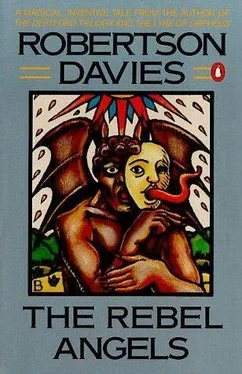Robertson Davies - The Rebel Angels
Здесь есть возможность читать онлайн «Robertson Davies - The Rebel Angels» весь текст электронной книги совершенно бесплатно (целиком полную версию без сокращений). В некоторых случаях можно слушать аудио, скачать через торрент в формате fb2 и присутствует краткое содержание. Жанр: Триллер, на английском языке. Описание произведения, (предисловие) а так же отзывы посетителей доступны на портале библиотеки ЛибКат.
- Название:The Rebel Angels
- Автор:
- Жанр:
- Год:неизвестен
- ISBN:нет данных
- Рейтинг книги:5 / 5. Голосов: 1
-
Избранное:Добавить в избранное
- Отзывы:
-
Ваша оценка:
- 100
- 1
- 2
- 3
- 4
- 5
The Rebel Angels: краткое содержание, описание и аннотация
Предлагаем к чтению аннотацию, описание, краткое содержание или предисловие (зависит от того, что написал сам автор книги «The Rebel Angels»). Если вы не нашли необходимую информацию о книге — напишите в комментариях, мы постараемся отыскать её.
The Rebel Angels — читать онлайн бесплатно полную книгу (весь текст) целиком
Ниже представлен текст книги, разбитый по страницам. Система сохранения места последней прочитанной страницы, позволяет с удобством читать онлайн бесплатно книгу «The Rebel Angels», без необходимости каждый раз заново искать на чём Вы остановились. Поставьте закладку, и сможете в любой момент перейти на страницу, на которой закончили чтение.
Интервал:
Закладка:
Why did it bother me? Because I had apprenticed myself to the hard trade of scholarship, which shrieks at the thought of a fake, and disgraces a man who, let us say, pretends to the existence of a Shakespeare Quarto that nobody else is able to find. If something is not defensible on every count, it is suspect and probably worthless. A trumpery puritanism, surely? No, but impossible to reconcile with such romantic deceptions as the fine, ambiguous instruments that came from our basement.
For such journeys Yerko assembled what he always called the Kodaly String Quartet; the other three were musicians in some sort of moral or financial disarray who were glad to travel free to New York with him in a station-wagon with perhaps ten instruments which remained with the dealer; Yerko returned to Canada by a different port of entry, without his quartet, but with a good deal of rubbish – broken or dismembered instruments – in the back of the car. Yerko, so large, so dark, long-haired, and melancholy in appearance, was a Customs officer's idea of a musician. Part of the preparation for the journey was getting Yerko sobered up so that he could drive the car and strike bargains without coming to grief, and convincing him that if he went to a gambling-house and risked any of the money Mamusia would certainly search him out and make him sorry for it. The payments were in cash, and Yerko returned from New York with bundles of bills in the lining of his musician's baggy black overcoat. The logic of my Mother and my Uncle was that Yerko was too conspicuous and too farcically musical in appearance to attract the wrong kind of attention.
This was the staple of their business. The perfectly honest work they did for some musicians of the highest rank did not pay so well, but it flattered them as luthiers, and gave them a valuable reputation among the people who provided romance and sound fiddles for the orchestras of North America.
3
Gypsies have a poor opinion of ill health, and nobody was permitted to ail in our house. Therefore, when I caught quite bad influenza I did what I could to conceal it. Mamusia supposed I had a cold, and there could be no thought of staying in my bed, that couch in the communal living-room; she insisted on her single treatment for all respiratory diseases – cloves of garlic shoved up the nose. It was disgusting, and made me feel worse, so I dragged myself to the University and took refuge in Hollier's outer room, where I sat on the sofa when he was likely to appear, and lay on it when he was not, and was sorry for myself.
Why not? Had I not troubles? My home was a place of discomfort and moral duplicity, where I had not even a proper bed to lie in. (You are rich, fool; get yourself an apartment and turn your back on them. Yes, but that would hurt their feelings, and with all their dreadful tricks, I love them and to leave them would be to leave what Tadeusz would have expected me to cherish.) My infatuation with Hollier was wearing me out, because there was never any sign from him that our single physical union might be repeated or that he cared very much for me. (Then bring him to the point. Have you no feminine resource? You are not of an age, nor is this a time in history for such shilly-shallying. Yes, but it shames me to think of thrusting myself on him. All right then, if you won't put out a hand for food you must starve! But how would I do it? – "There's a woman in the window with her pants down!" Shut up! Shut up! Stop singing! I'm singing from the root, Maria: what did you expect? Fairy bells? Oh God, this is Gretchen, listening to the Devil in the church! No, it's your good friend Parlabane, Maria, but you are not worthy of such a friend: you are a simpering fool.) My academic work was hanging fire. I was pegging away at Rabelais, whose existing texts I now knew well, but I had been promised a splendid manuscript that would bring me just the kind of attention I needed – that would lift me above the world in which Mamusia and Yerko could disgrace me – and apart from that one reference to it in September Hollier had never said a single word about it further. (Ask him about it. I wouldn't dare; he would just say that when he had anything further to tell, he would tell me.) I felt dreadful, I had a fever, my head felt as if it were stuffed with oily rags. (Take two aspirin and lie down.)
I was lying down, in a deep sleep and almost certainly with my mouth open, when Hollier returned one afternoon. I tried to leap up, and fell down. He helped me back to the sofa, felt my head and looked grave. I wept a few feeble tears and told him why I could not be ill at home.
"I suppose you're worried about your work," he said. "You don't know where you're going, and that is my fault. I had expected to be able to talk to you about that manuscript before this, but the bloody thing has vanished. No, by God, it's been stolen, and I know who has it."
This was exciting, and by the time he had told me about the Cornish bequests, and Professor Darcourt's attempt to nail down Professor McVarish about the manuscript he had certainly borrowed, and McVarish's unsatisfactory attitude towards the whole thing, I felt much better and was able to get up and make us some tea.
I had never seen Hollier in this mood before. "I know that scoundrel has it," he kept saying; "he's hugging it to himself, like the dog in the manger he is. What in God's name does he expect he can do with it?"
I tried being the voice of reason. "He's a Renaissance historian," I said, "so I suppose he wants to make something of it in his own line."
"He's the wrong kind of Renaissance historian! What does he know about the history of thought? He knows politics and he knows something about Renaissance art, but he hasn't the slightest claim to be a cultural or intellectual historian, and I am, and I want that manuscript!"
This was glorious! Hollier was angry and unreasonable; only once before, when first I told him about the bomari, had I seen him so excited. I didn't care if he was talking rather foolishly. I liked it.
"I know what you're going to say. You're going to say that eventually the manuscript must come to light because McVarish will write about it, and I'll be able to ask to see it, and undoubtedly expose a lot of his nonsense. You're going to say that I should go to Arthur Cornish and demand a show-down. But what would young Cornish know about such things! No, no; I want that manuscript before anybody else has monkeyed with it. I told you I didn't have time to look at those letters for more than a glance. But a glance is all it needed to show that they are written in Latin, of course, but Latin with plenty of what I suppose was quotation in Greek and several words in Hebrew, sticking out in those big, chunky, uncompromising Hebrew characters – and what do you suppose that means?" I had an idea, but I thought I had better let him tell me. "Cabbala – that's what it could mean! Rabelais writing to Paracelsus about Cabbala. Perhaps he was deep in it; perhaps he scorned it; perhaps he was making inquiry. Perhaps he was one of that group who were trying to Christianize it. But whatever it is, what could be more significant to uncover now? And that's what I want to do – to discover and make known this group of letters as they should be made known, and not in some half-baked interpretation of McVarish's."
"I suppose they could be rather mild stuff. I mean, I hope they aren't, but it could be."
"Don't be stupid! It wasn't a time, you know, when one great scholar wrote to another to ask how his garden was coming along. It was dangerous; the letters could fall into the hands of repressive Church authorities and once again Rabelais's name would have been mud. Must I remind you? Protestantism was the Communism of the time and Rabelais was too near to Protestantism for safety. But Cabbala could have put him in prison. Pushed far enough it could have meant death! The stake! Mild stuff! Really Maria, you disappoint me! Because I want to count you in on this, you know; when my commentary on those letters is printed, your name shall stand with mine, because I want you to do all the work in verifying the Greek and Hebrew quotations. More than that: the Stratagems shall be all yours, to translate and edit."
Читать дальшеИнтервал:
Закладка:
Похожие книги на «The Rebel Angels»
Представляем Вашему вниманию похожие книги на «The Rebel Angels» списком для выбора. Мы отобрали схожую по названию и смыслу литературу в надежде предоставить читателям больше вариантов отыскать новые, интересные, ещё непрочитанные произведения.
Обсуждение, отзывы о книге «The Rebel Angels» и просто собственные мнения читателей. Оставьте ваши комментарии, напишите, что Вы думаете о произведении, его смысле или главных героях. Укажите что конкретно понравилось, а что нет, и почему Вы так считаете.












